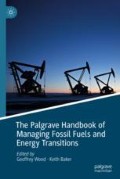Abstract
The United Kingdom Continental Shelf (UKCS), particularly the oil and gas activities in the North Sea have been and continue to be critical for the economic development and empowerment of the region. There has been a decline in oil & gas production in the North Sea caused by several factors, including the fall in global oil prices and the global transition towards a low-carbon energy future transition. Considering this, and questions of future energy security, the UK government adopted a strategy in 2016 to maximize the economic recovery (MER) and extract as much value as possible from the fields within the UKCS. The UK has to consider the MER strategy in light of the global energy transition, where energy supply is expected to transition from fossil fuels to low carbon sources with a view to accommodate the provisions of the Paris Agreement on Climate Change of 2015, the UK Climate Change Act 2008, the UK Carbon Plan, 2011 and the UK Clean Growth Strategy 2017. The UK therefore has to align its MER strategies with the strategies it presently has and will have to develop going forward on energy transition and the ambitious climate change objectives under the Paris Agreement and UK legislation and policies. The UK also has to take into account the likely impact of Brexit on its energy transition and climate change objectives, and the MER Strategy. This paper demonstrates that the successful implementation of the UK’s MER Strategy alongside achieving of the UK’s climate change obligations and energy transition targets will be challenging, and will require concerted sector-wide energy efficiency efforts and highly innovative low-carbon and emissions removal technology. Whether this is achievable will depend on the UK’s preparedness (both from policy and technological innovation) to offset the carbon emissions arising from the consumption of the oil and gas that will be recovered from the UKCS under the MER Strategy.
Access this chapter
Tax calculation will be finalised at checkout
Purchases are for personal use only
References
BBC News. 2019. May Offers MPs Brexit Delay Vote. https://www.bbc.com/news/uk-politics-47373996.
Butler, N. 2016. Can the North Sea Avoid Decline? Financial Times. Ft.com. https://www.ft.com/content/c920bab0-81b2-3061-8ef8-f12cca379006.
Carbon Brief. 2018. UK Will Miss Climate Goals Despite New Strategy, Says Official Watchdog. Carbon Brief. https://www.carbonbrief.org/uk-will-miss-climate-goals-despite-new-strategy-says-official-watchdog.
ClientEarth. 2015. The Infrastructure Bill and the Climate Change Act—A Bump in the Road, Not a U-turn. https://www.clientearth.org/infrastructure-bill-climate-change-act-bump-road-not-u-turn/.
Department for Business, Energy and Industrial Strategy (BEIS). 2017. Industrial Strategy: Building a Britain Fit for the Future. https://www.gov.uk/government/publications/industrial-strategy-building-a-britain-fit-for-the-future.
Department for Business, Energy and Industrial Strategy (BEIS). 2018. Digest of United Kingdom Energy Statistics 2018. https://assets.publishing.service.gov.uk/government/uploads/system/uploads/attachment_data/file/728438/DUKES_LTT.pdf.
Department of Energy and Climate Change. 2014. Government Response to Sir Ian Wood’s UKCS: Maximising Economic Recovery Review. DECC. https://www.ogauthority.co.uk/media/1018/wood_review_government_response.pdf.
Eisourcebook.org. 2015. The UKCS Designations. http://www.eisourcebook.org/cms/December%202015/UK%20Continental%20Shelf%20Designations%202015.pdf.
Energy Institute. 2019. Energy Insight: Carbon Capture and Storage (CCS) and Carbon Capture Usage and Storage (CCUS) in the UK. https://knowledge.energyinst.org/search/record/_nocache?id=111292&utm_source=SZY+-+Energy+Futures&utm_campaign=052bab1cca-EMAIL_CAMPAIGN_2018_08_01_01_45_COPY_01&utm_medium=email&utm_term=0_887519ca7e-052bab1cca-67059511.
Forbes. 2019. Sir Ian Wood. https://www.forbes.com/profile/ian-wood/#1f2897c348dd.
Global CCS Institute. 2018. The Carbon Capture and Storage Readiness Index 2018. http://decarboni.se/sites/default/files/publications/202108/ccs-readiness-index-2018global-ccs-institute-2018digital.pdf.
HM Government. 2011. Carbon Plan 2011. https://assets.publishing.service.gov.uk/government/uploads/system/uploads/attachment_data/file/47613/3702-the-carbon-plan-delivering-our-low-carbon-future.pdf.
HM Government. 2017. The Clean Growth Strategy. https://www.gov.uk/government/publications/clean-growth-strategy.
HM Government. 2018. Clean Growth: UK Carbon Capture Usage and Storage Deployment Pathway Action Plan. https://assets.publishing.service.gov.uk/government/uploads/system/uploads/attachment_data/file/759637/beis-ccus-action-plan.pdf.
House of Commons Library (UK). 2018. Future of the UK Oil and Gas Industry. CDP 2018/0210. UK House of Commons Library. https://researchbriefings.parliament.uk/ResearchBriefing/Summary/CDP-2018-0210.
Hunt, A. and Wheeler, B. 2019. Brexit: All You Need to Know About the UK Leaving the EU. BBC News. https://www.bbc.com/news/uk-politics-32810887.
International Energy Agency (IEA). 2017. WEO 2017: Key Findings. https://www.iea.org/weo2017/.
International Energy Agency (IEA). 2018. World Energy Outlook 2018 Examines Future Patterns of Global Energy System at a Time of Increasing Uncertainties. https://www.iea.org/newsroom/news/2018/november/world-energy-outlook-2018-examines-future-patterns-of-global-energy-system-at-a-t.html.
International Renewable Energy Agency (IRENA). 2019. Energy Transition. https://www.irena.org/energytransition.
Legislation.gov.uk. 1964. Continental Shelf Act 1964. https://www.legislation.gov.uk/ukpga/1964/29.
Legislation.gov.uk. 1998. Petroleum Act 1998. https://www.legislation.gov.uk/ukpga/1998/17/part/1A.
Maritime Forum—European Commission. 2018. Multi-use Ocean Platforms: An Emerging Concept. Maritime Forum, European Commission. https://webgate.ec.europa.eu/maritimeforum/en/node/4259.
Mead, L. 2018. UK Submits Long-term Strategy to Achieve Climate Goals Under Paris Agreement. News, SDG Knowledge Hub, IISD. http://sdg.iisd.org/news/uk-submits-long-term-strategy-to-achieve-climate-goals-under-paris-agreement/.
Norton Rose Fulbright. 2018. Impact of Brexit on the Energy Sector. https://www.nortonrosefulbright.com/en/knowledge/publications/686cd7c7/impact-of-brexit-on-the-energy-sector.
Office for Low Emissions Vehicles. 2018. Reducing Emissions From Road Transport: Road to Zero Strategy. https://www.gov.uk/government/publications/reducing-emissions-from-road-transport-road-to-zero-strategy.
Oil and Gas Authority. 2016. The Maximising Economic Recovery Strategy for the UK. https://www.ogauthority.co.uk/media/3229/mer-uk-strategy.pdf.
Oil and Gas Authority. 2018. MER UK Awards. https://www.ogauthority.co.uk/news-publications/mer-uk-awards/.
Oil and Gas Authority. 2019. MER UK Forum and Taskforces. https://www.ogauthority.co.uk/about-us/mer-uk-forum-task-forces/.
OilPrice.com. 2018. UK North Sea Oil Production Set To Resume Decline In 2019. OilPrice.com. https://oilprice.com/Energy/Energy-General/UK-North-Sea-Oil-Production-Set-To-Resume-Decline-In-2019.html.
Power Engineering International. 2018. Largest Battery Storage Project in UK is Unveiled. https://www.powerengineeringint.com/articles/2018/07/largest-battery-storage-project-in-uk-is-unveiled.html.
PwC. n.d. Energy Transition in the North Sea. https://www.pwc.nl/en/industries/energy-utilities/energy-transition/energy-transition-in-the-north-sea.html.
Ross, K. 2018. Solar and Wind Now the Cheapest Power Source Says BloombergNEF. https://www.powerengineeringint.com/articles/2018/11/solar-and-wind-now-the-cheapest-power-source-says-bloombergnef.html.
Space@Sea. 2017. About SPACE@SEA. https://spaceatsea-project.eu/about-space-at-sea.
The Guardian. 2019. EU to Decide on UK’s Brexit Extension, Wed April 10, 2019. https://www.theguardian.com/politics/live/2019/apr/10/brexit-eu-to-decide-on-uk-extension-live-news.
The Oil & Gas Technology Centre. 2019. Overview—Oil & Gas Technology Centre. https://www.theogtc.com/about-us/overview/.
UK Oil and Gas Industry. 2016. Vision 2035. https://www.ogauthority.co.uk/about-us/vision-2035/.
United Nations Framework Convention on Climate Change (UNFCCC). 1992. The UNFCCC. https://unfccc.int/documents?search2=&search3=United%20National%20Framework%20Convention&f%5B0%5D=document_type%3A353&page=0%2C0%2C1.
United Nations Framework Convention on Climate Change (UNFCCC). 2016. European Union NDC. https://www4.unfccc.int/sites/NDCStaging/Pages/Party.aspx?party=GBR.
United Nations Framework Convention on Climate Change (UNFCCC). 2018. The Paris Agreement. https://unfccc.int/process-and-meetings/the-paris-agreement/the-paris-agreement.
Vliz.be. 2015. EU Mermaid Project. http://www.vliz.be/projects/mermaidproject/.
Wind Power Monthly. 2018. Massive Energy Storage Growth Expected in UK. https://www.windpowermonthly.com/article/1498021/massive-energy-storage-growth-expected-uk.
Wood, S. 2014. UKCS Maximising Recovery Review: Final Report. https://www.ogauthority.co.uk/media/1014/ukcs_maximising_recovery_review.pdf.
Wood Group. 2019. Wood Group. https://www.woodplc.com/who-we-are/about-us
Author information
Authors and Affiliations
Corresponding author
Editor information
Editors and Affiliations
Rights and permissions
Copyright information
© 2020 The Author(s)
About this chapter
Cite this chapter
Mete, G., Karanja, W., Njenga, N. (2020). Fossil Fuels and Transitions: The UK Maximising Economic Recovery Strategy and Low-Carbon Energy Transitions. In: Wood, G., Baker, K. (eds) The Palgrave Handbook of Managing Fossil Fuels and Energy Transitions. Palgrave Macmillan, Cham. https://doi.org/10.1007/978-3-030-28076-5_7
Download citation
DOI: https://doi.org/10.1007/978-3-030-28076-5_7
Published:
Publisher Name: Palgrave Macmillan, Cham
Print ISBN: 978-3-030-28075-8
Online ISBN: 978-3-030-28076-5
eBook Packages: EnergyEnergy (R0)

